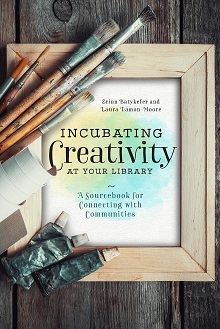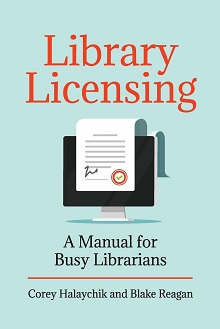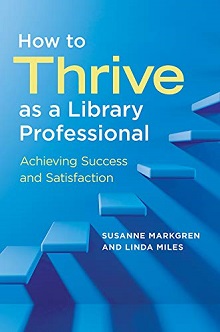Connecting with Communities, Licensing, & How To Thrive as a Library Professional | Pro Media
Librarians, artists, and educators will find this a valuable and inspiring guide for developing creative community programs.
 Batykefer, Erinn & Laura Damon-Moore. Incubating Creativity at Your Library: A Sourcebook for Connecting with Communities. ALA. 2019. 192p. ISBN 9780838918623. pap. $54.99. PRO MEDIA
Batykefer, Erinn & Laura Damon-Moore. Incubating Creativity at Your Library: A Sourcebook for Connecting with Communities. ALA. 2019. 192p. ISBN 9780838918623. pap. $54.99. PRO MEDIA
Libraries have long been centers of inspiration and creativity, but how does that happen? As library science students, Batykefer and Damon-Moore (both LJ Movers & Shakers, 2014; The Artist’s Library: A Field Guide) started the Library as Incubator Project to answer that question and to find out how libraries can best serve artists. They define artists as anyone who uses physical or digital tools to make something new, and urge librarians to rely on existing resources and materials they have access to remotely, including via databases and interlibrary loan, and to build on ideas that have worked elsewhere. This is not a "how to" guide. Readers won’t find lists of what to purchase or how to design spaces; instead, they’ll learn how to amplify what their library already has and how to fill in the gaps. The reassuring and enthusiastic tone will bolster librarians: "You can do this. You already have plenty to work with." Case studies, including how Jessica Pigza launched Handmade Crafternoons at the New York Public Library, and how Mallory Arents established Adult Day Camp at Darien Library, CT, round out the work. Included are a sample project kit for a program, "The Great Poetry Hunt," and a form for data collection for program assessment.
VERDICT Librarians, artists, and educators will find this a valuable and inspiring guide for developing creative community programs.—Susan Belsky, Oshkosh P.L., WI
 Halaychik, Corey & Blake Reagan. Library Licensing: A Manual for Busy Librarians. Libraries Unlimited. 2019. 170p. ISBN 9781440870767. pap. $65. PRO MEDIA
Halaychik, Corey & Blake Reagan. Library Licensing: A Manual for Busy Librarians. Libraries Unlimited. 2019. 170p. ISBN 9781440870767. pap. $65. PRO MEDIA
The scope of this work is broader than the title suggests. Halaychik (head of content management, Univ. of Texas at Austin Libs.) and Reagan (director of procurement svcs., Univ. of Tennessee Syst.) discuss not only the licensing agreements of electronic resources but also many other contracts library professionals regularly encounter, such as services for maintenance, catering, or speakers. Librarians need not be intimidated by contracts, the authors say. They explain basic contract language, describe standard clauses in terms easily understood by nonlawyers, and cover different types of contract maintenance software. Readers will pick up phrases that can be adapted to their needs, and they’ll appreciate the appendixes, which include templates for standardizing and streamlining a contract manual for their institutions.
VERDICT This is a solid guide for understanding, creating, and managing licensing agreements. Even readers with little experience will gain confidence and be able to approach contract negotiations from a position of knowledge and strength. Library professionals without ready access to legal advisers will refer to this work time and again.—Lydia Olszak, Bosler Memorial Lib., Carlisle, PA
 Markgren, Susanne & Linda Miles. How To Thrive as a Library Professional: Achieving Success and Satisfaction. Libraries Unlimited. 2019. 130p. ISBN 9781440867118. pap. $45. PRO MEDIA
Markgren, Susanne & Linda Miles. How To Thrive as a Library Professional: Achieving Success and Satisfaction. Libraries Unlimited. 2019. 130p. ISBN 9781440867118. pap. $45. PRO MEDIA
With this general guide to succeeding as a librarian, Markgren (Lib. for Technical Services, Manhattan Coll.) and Miles (Eugenio María de Hostos Community Coll.–City Univ. of New York) misstep with shallow dives into too many topics, including networking, culture, communication, self-promotion, mindfulness, and reflective practice. With several outdated and questionable sources and lackluster writing, this addition to the oversaturated self-help genre isn’t very helpful. The authors ignore systemic problems, such as overwork and undervaluing of already low salaries, lack of equity and diversity, and problematic management, and instead put the onus on individual employees to fix themselves—a naive and privileged position. Markgren and Miles do bring up a study on library worker morale but are quick to dismiss it; researching problems in the field, in their view, contributes to a negative worldview, which sums up the takeaway of their book—rather than addressing the issues plaguing librarianship, they stick their head in the sand and tell readers to manage their time better and craft a few elevator speeches.
VERDICT Librarians need information on how to obtain fair salaries and workloads, create more welcoming workplaces for librarians of color and LGBT colleagues, get more women and people of color into management, and navigate burnout; this superficial work offers little new or useful.—Melissa Engleman, Martin, TN
RELATED
ALREADY A SUBSCRIBER? LOG IN
We are currently offering this content for free. Sign up now to activate your personal profile, where you can save articles for future viewing









Add Comment :-
Comment Policy:
Comment should not be empty !!!